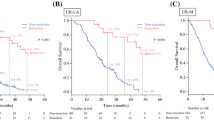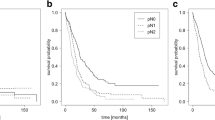Abstract
Background
Unresectable pancreatic cancer (UR-PC) has a poor prognosis. Although conversion surgery has been considered a promising strategy for improving prognosis in UR-PC, the clinical benefit offered to patients with UR-PC remains controversial. This study aimed to investigate the clinical benefits of conversion surgery in patients with UR-PC.
Methods
We evaluated patients with UR-PC referred to our department for possible surgical resection between January 2008 and June 2017. Resectability was evaluated using multimodal imaging in patients who underwent chemotherapy for more than 6 months. Conversion surgery was performed only in patients who were judged eligible for R0 resection.
Results
In total, 90 patients were evaluated. Among them, only 22 (24.4%) could actually undergo conversion surgery, and the R0 resection rate was 72.7% (16/22). Although Evans grade ≥ IIB was noted in six patients (27.3%), none achieved complete response (CR). The median survival time was significantly longer among patients who underwent conversion surgery than in the unresected patients who underwent chemotherapy (21.3 months vs. 12.6 months; p < 0.001). Multivariate and Kaplan–Meier analyses revealed microvascular invasion to have a significant adverse effect on recurrence-free survival (RFS: 7 months vs. not reached, p = 0.004) and overall survival (OS: 21 months vs. 85 months, p = 0.047).
Conclusions
After long-term chemotherapy, conversion surgery for UR-PC is associated with long-term survival. Microvascular invasion is predictive of poor prognosis in these patients; adjuvant protocols are therefore needed for patients with microvascular invasion.



Similar content being viewed by others
References
Siegel RL, Miller KD, Jemal A (2018) Cancer statistics, 2018. CA Cancer J Clin 68:7–30
Oettle H, Post S, Neuhaus P et al (2007) Adjuvant chemotherapy with gemcitabine vs observation in patients undergoing curative-intent resection of pancreatic cancer: a randomized controlled trial. JAMA 297:267–277
Li D, Xie K, Wolff R et al (2004) Pancreatic cancer. Lancet 363:1049–1057
Fukuchi M, Ishiguro T, Ogata K et al (2015) Prognostic role of conversion surgery for unresectable gastric cancer. Ann Surg Oncol 22:3618–3624
Yokota T, Kato K, Hamamoto Y et al (2016) Phase II study of chemoselection with docetaxel plus cisplatin and 5-fluorouracil induction chemotherapy and subsequent conversion surgery for locally advanced unresectable oesophageal cancer. Br J Cancer 115:1328–1334
Amano R, Kimura K, Nakata B et al (2015) Pancreatectomy with major arterial resection after neoadjuvant chemoradiotherapy gemcitabine and S-1 and concurrent radiotherapy for locally advanced unresectable pancreatic cancer. Surgery 158:191–200
Nitsche U, Wenzel P, Siveke JT et al (2015) Resectability after first-line FOLFIRINOX in initially unresectable locally advanced pancreatic cancer: a single-center experience. Ann Surg Oncol 22(Suppl 3):S1212–1220
Hackert T, Sachsenmaier M, Hinz U et al (2016) Locally advanced pancreatic cancer: neoadjuvant therapy with folfirinox results in resectability in 60% of the patients. Ann Surg 264:457–463
Hitchcock KE, Nichols RC, Morris CG et al (2017) Feasibility of pancreatectomy following high-dose proton therapy for unresectable pancreatic cancer. World J Gastrointest Surg 9:103–108
Saito T, Ishido K, Kudo D et al (2017) Combination therapy with gemcitabine and nab-paclitaxel for locally advanced unresectable pancreatic cancer. Mol Clin Oncol 6:963–967
Sui K, Okabayashi T, Shima Y et al (2017) Clinical effects of chemoradiotherapy in pursuit of optimal treatment of locally advanced unresectable pancreatic cancer. Br J Radiol 90:20170165
Tempero MA, Malafa MP, Behrman SW et al (2014) Pancreatic adenocarcinoma, version 2.2014: featured updates to the NCCN guidelines. J Natl Compr Cancer Netw JNCCN 12:1083–1093
Nakamura K, Yamaguchi T, Ishihara T et al (2006) Phase II trial of oral S-1 combined with gemcitabine in metastatic pancreatic cancer. Br J Cancer 94:1575–1579
Ueno H, Okusaka T, Furuse J et al (2011) Multicenter phase II study of gemcitabine and S-1 combination therapy (GS Therapy) in patients with metastatic pancreatic cancer. Jpn J Clin Oncol 41:953–958
Okusaka T, Ikeda M, Fukutomi A et al (2014) Phase II study of FOLFIRINOX for chemotherapy-naive Japanese patients with metastatic pancreatic cancer. Cancer Sci 105:1321–1326
Eisenhauer EA, Therasse P, Bogaerts J et al (2009) New response evaluation criteria in solid tumours: revised RECIST guideline (version 1.1). Eur J Cancer 45:228–247
Uesaka K, Boku N, Fukutomi A et al (2016) Adjuvant chemotherapy of S-1 versus gemcitabine for resected pancreatic cancer: a phase 3, open-label, randomised, non-inferiority trial (JASPAC 01). Lancet 388:248–257
Evans DB, Rich TA, Byrd DR et al (1992) Preoperative chemoradiation and pancreaticoduodenectomy for adenocarcinoma of the pancreas. Arch Surg 127:1335–1339
Lindenmann J, Fink-Neuboeck N, Koesslbacher M et al (2014) The influence of elevated levels of C-reactive protein and hypoalbuminemia on survival in patients with advanced inoperable esophageal cancer undergoing palliative treatment. J Surg Oncol 110:645–650
Kato K, Kondo S, Hirano S et al (2011) Adjuvant surgical therapy for patients with initially-unresectable pancreatic cancer with long-term favorable responses to chemotherapy. J Hepato-Biliary-Pancreat Sci 18:712–716
Satoi S, Yamaue H, Kato K et al (2013) Role of adjuvant surgery for patients with initially unresectable pancreatic cancer with a long-term favorable response to non-surgical anti-cancer treatments: results of a project study for pancreatic surgery by the Japanese Society of Hepato-Biliary-Pancreatic Surgery. J Hepato Biliary Pancreat Sci 20:590–600
Opendro SS, Satoi S, Yanagimoto H et al (2014) Role of adjuvant surgery in initially unresectable pancreatic cancer after long-term chemotherapy or chemoradiation therapy: survival benefit? J Hepato Biliary Pancreat Sci 21:695–702
Burris HA 3rd, Moore MJ, Andersen J et al (1997) Improvements in survival and clinical benefit with gemcitabine as first-line therapy for patients with advanced pancreas cancer: a randomized trial. J Clin Oncol 15:2403–2413
Ueno H, Ikeda M, Ueno M et al (2016) Phase I/II study of nab-paclitaxel plus gemcitabine for chemotherapy-naive Japanese patients with metastatic pancreatic cancer. Cancer Chemother Pharmacol 77:595–603
Conroy T, Desseigne F, Ychou M et al (2011) FOLFIRINOX versus gemcitabine for metastatic pancreatic cancer. New Engl J Med 364:1817–1825
Gemenetzis G, Groot VP, Blair AB, et al (2019) Survival in locally advanced pancreatic cancer after neoadjuvant therapy and surgical resection. Ann Surg 270:340–347
Spinelli GP, Zullo A, Romiti A et al (2006) Long-term survival in metastatic pancreatic cancer. A case report and review of the literature. JOP 7:486–491
Arnaoutakis GJ, Rangachari D, Laheru DA et al (2011) Pulmonary resection for isolated pancreatic adenocarcinoma metastasis: an analysis of outcomes and survival. J Gastrointest Surg 15:1611–1617
Matsuki R, Sugiyama M, Takei H et al (2018) Long-term survival with repeat resection for lung oligometastasis from pancreatic ductal adenocarcinoma: a case report. Surg Case Rep 4:26
Shimada K, Kosuge T, Yamamoto J et al (2004) Successful outcome after resection of pancreatic cancer with a solitary hepatic metastasis. Hepatogastroenterology 51:603–605
Singh A, Singh T, Chaudhary A (2010) Synchronous resection of solitary liver metastases with pancreaticoduodenectomy. JOP 11:434–438
Fathi A, Christians KK, George B et al (2015) Neoadjuvant therapy for localized pancreatic cancer: guiding principles. J Gastrointest Oncol 6:418–429
Christians KK, Evans DB (2015) Additional support for neoadjuvant therapy in the management of pancreatic cancer. Ann Surg Oncol 22:1755–1758
Tsai TJ, Chau GY, Lui WY et al (2000) Clinical significance of microscopic tumor venous invasion in patients with resectable hepatocellular carcinoma. Surgery 127:603–608
Todoroki T, Koike N, Morishita Y et al (2003) Patterns and predictors of failure after curative resections of carcinoma of the ampulla of Vater. Ann Surg Oncol 10:1176–1183
Lang H, Lindner V, Letourneux H et al (2004) Prognostic value of microscopic venous invasion in renal cell carcinoma: long-term follow-up. Eur Urol 46:331–335
Betge J, Pollheimer MJ, Lindtner RA et al (2012) Intramural and extramural vascular invasion in colorectal cancer: prognostic significance and quality of pathology reporting. Cancer 118:628–638
Li P, Ling YH, Zhu CM et al (2015) Vascular invasion as an independent predictor of poor prognosis in nonmetastatic gastric cancer after curative resection. Int J Clin Exp Pathol 8:3910–3918
Zhou Y, Yu F, Wu L et al (2015) Survival after gastrectomy in node-negative gastric cancer: a review and meta-analysis of prognostic factors. Med Sci Monit 21:1911–1919
Shimada Y, Saji H, Kato Y et al (2016) The frequency and prognostic impact of pathological microscopic vascular invasion according to tumor size in non-small cell lung cancer. Chest 149:775–785
Acknowledgements
None.
Author information
Authors and Affiliations
Corresponding author
Ethics declarations
Conflict of interest
The authors declare that they have no conflict of interest.
Informed consent
Informed consent was waived due to the retrospective nature of this study.
Human and animal rights
This case–control study was approved by the Ethical Review Board (B180600049) of Yokohama City University Hospital, Yokohama, Japan.
Additional information
Publisher's Note
Springer Nature remains neutral with regard to jurisdictional claims in published maps and institutional affiliations.
Rights and permissions
About this article
Cite this article
Tsuchiya, N., Matsuyama, R., Murakami, T. et al. Role of Conversion Surgery for Unresectable Pancreatic Cancer After Long-Term Chemotherapy. World J Surg 44, 2752–2760 (2020). https://doi.org/10.1007/s00268-020-05503-4
Published:
Issue Date:
DOI: https://doi.org/10.1007/s00268-020-05503-4




